

SUBSCRIBE TO OUR FREE NEWSLETTER
Daily news & progressive opinion—funded by the people, not the corporations—delivered straight to your inbox.
5
#000000
#FFFFFF
To donate by check, phone, or other method, see our More Ways to Give page.


Daily news & progressive opinion—funded by the people, not the corporations—delivered straight to your inbox.
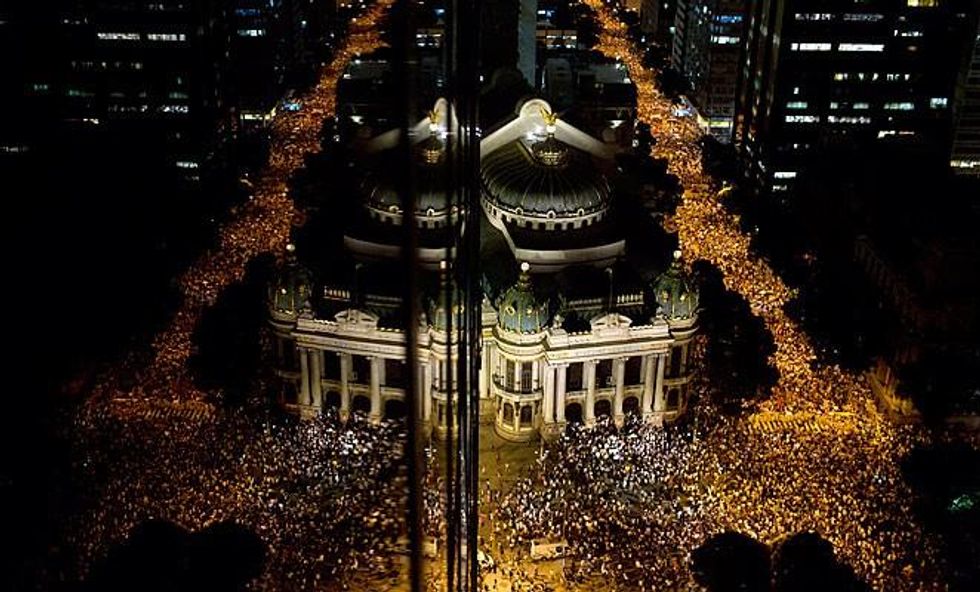
Crowding the streets, protesters waved Brazilian flags, danced and chanted slogans such as "The people have awakened" and "Pardon the inconvenience, Brazil is changing," Reuters reports.
Chaos reigned in some corners as police countered a number of the demonstrations with brute force. In Rio de Janiero, crowds swelled to roughly 100,000 people and police used tear gas, pepper spray and, as evidenced by an video posted on Brazil's Extra 15, live rounds to disperse them.
In the political capital of Brasilia, demonstrators scaled the roof of Brazil's Congress building before storming the interior.
And in the southeastern city of Belo Horizonte, over 20,000 protesters rallied outside of the Confederations Cup football tournament in the second day of protests against the event.
Other protests were reported in Sao Paulo, Curitiba, Vitoria, Fortaleza, Recife, Belem and Salvador.
Though the 'back-breaking piece of straw,' as Nation editor Dave Zirin writes, that sparked the protests was a spike in transportation fares, the protests are largely against the billions of public funds being invested in tourist infrastructure and events such as the upcoming 2014 World Cup and 2016 Olympics while public services and the population continue to suffer.
According to government estimates, hosting the 2014 World Cup will cost the country--where almost one-fifth of the country lives in poverty--approximately $14.5bn. Some tickets are expected to cost more than the country's minimum wage of $300.
"For many years the government has been feeding corruption. People are demonstrating against the system," said Graciela Cacador who was protesting in Sao Paulo. "They spent billions of dollars building stadiums and nothing on education and health."
Thus far, the demonstrations have spread to over 100 towns and cities despite mass police crackdowns. According to AP, more protests are being planned on social media sites for Tuesday in Sao Paulo and Brasilia.
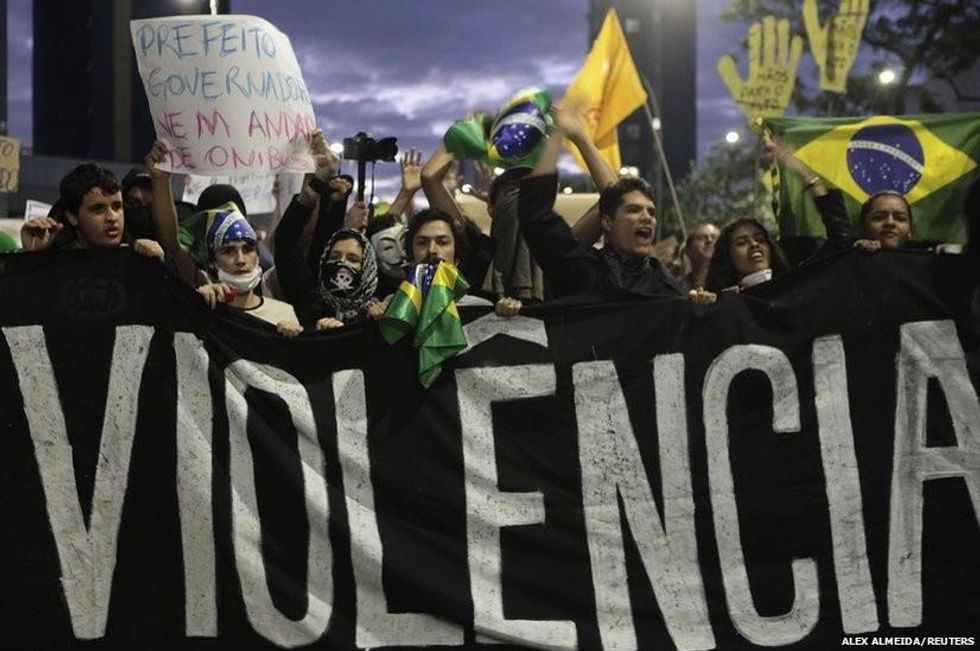
Rio de Janiero:
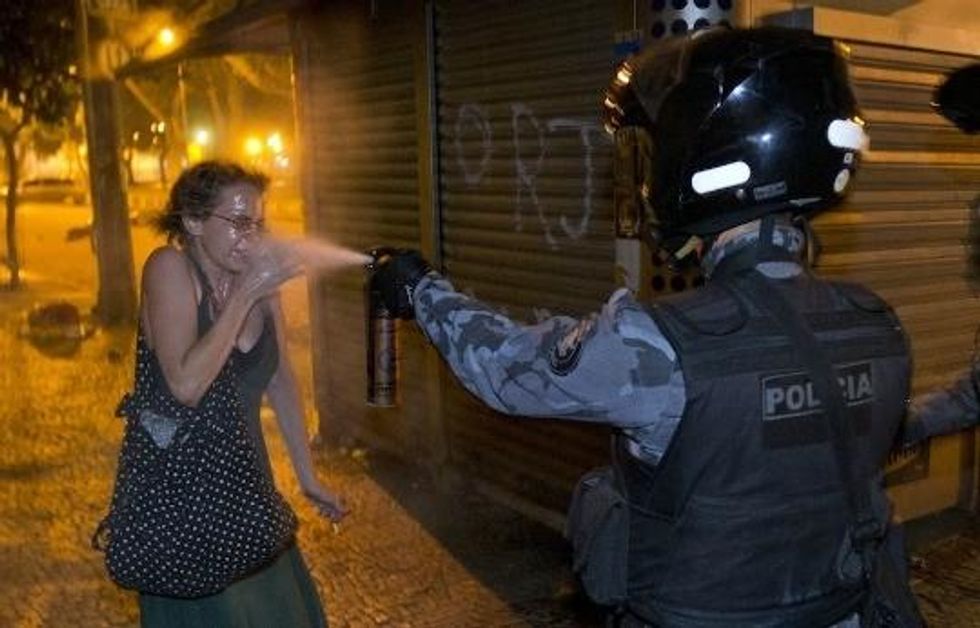
This short video shows the scale of the demonstration in Rio de Janiero.
And this video, posted on Brazil's news site Extra 15, reveals police shooting live rounds at protesters.
Brasilia:
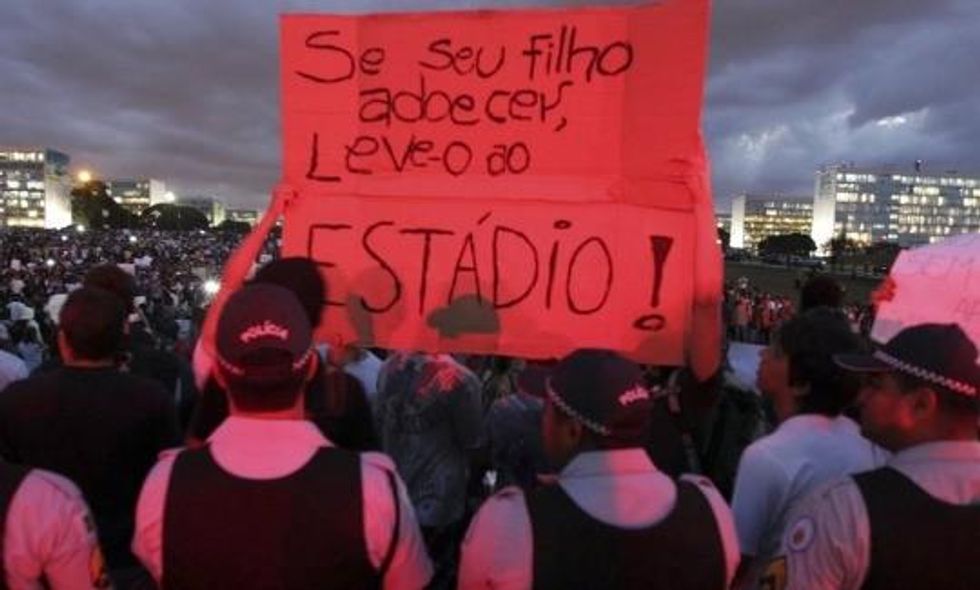
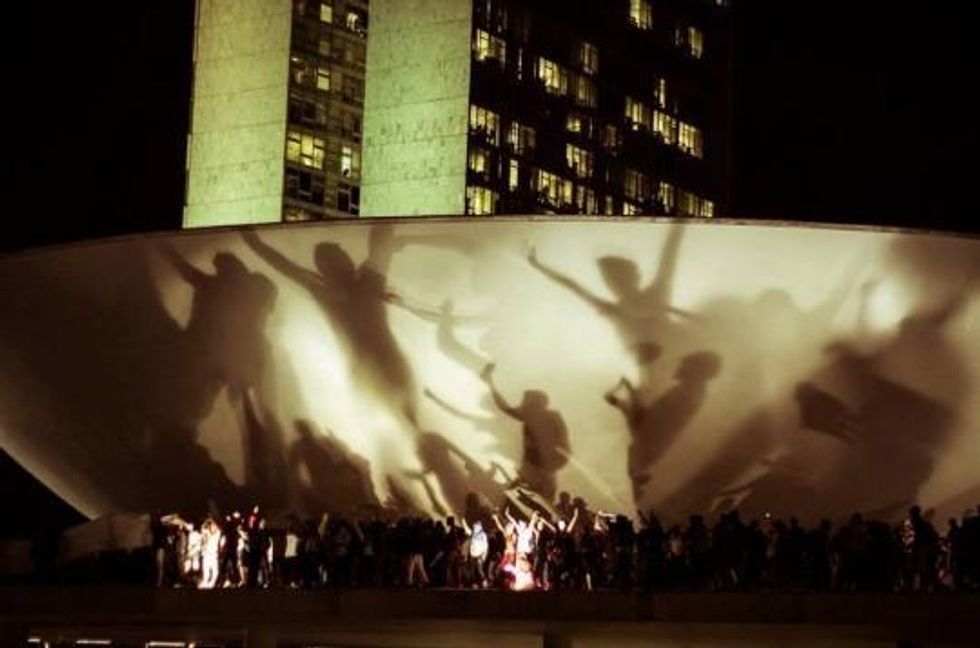
Belo Horizonte:
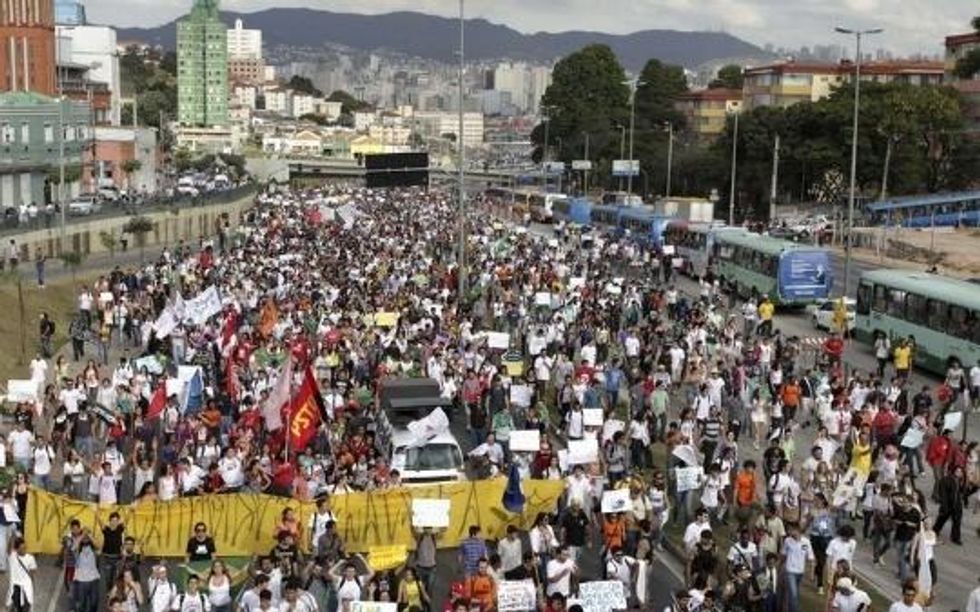
Political revenge. Mass deportations. Project 2025. Unfathomable corruption. Attacks on Social Security, Medicare, and Medicaid. Pardons for insurrectionists. An all-out assault on democracy. Republicans in Congress are scrambling to give Trump broad new powers to strip the tax-exempt status of any nonprofit he doesn’t like by declaring it a “terrorist-supporting organization.” Trump has already begun filing lawsuits against news outlets that criticize him. At Common Dreams, we won’t back down, but we must get ready for whatever Trump and his thugs throw at us. Our Year-End campaign is our most important fundraiser of the year. As a people-powered nonprofit news outlet, we cover issues the corporate media never will, but we can only continue with our readers’ support. By donating today, please help us fight the dangers of a second Trump presidency. |

Crowding the streets, protesters waved Brazilian flags, danced and chanted slogans such as "The people have awakened" and "Pardon the inconvenience, Brazil is changing," Reuters reports.
Chaos reigned in some corners as police countered a number of the demonstrations with brute force. In Rio de Janiero, crowds swelled to roughly 100,000 people and police used tear gas, pepper spray and, as evidenced by an video posted on Brazil's Extra 15, live rounds to disperse them.
In the political capital of Brasilia, demonstrators scaled the roof of Brazil's Congress building before storming the interior.
And in the southeastern city of Belo Horizonte, over 20,000 protesters rallied outside of the Confederations Cup football tournament in the second day of protests against the event.
Other protests were reported in Sao Paulo, Curitiba, Vitoria, Fortaleza, Recife, Belem and Salvador.
Though the 'back-breaking piece of straw,' as Nation editor Dave Zirin writes, that sparked the protests was a spike in transportation fares, the protests are largely against the billions of public funds being invested in tourist infrastructure and events such as the upcoming 2014 World Cup and 2016 Olympics while public services and the population continue to suffer.
According to government estimates, hosting the 2014 World Cup will cost the country--where almost one-fifth of the country lives in poverty--approximately $14.5bn. Some tickets are expected to cost more than the country's minimum wage of $300.
"For many years the government has been feeding corruption. People are demonstrating against the system," said Graciela Cacador who was protesting in Sao Paulo. "They spent billions of dollars building stadiums and nothing on education and health."
Thus far, the demonstrations have spread to over 100 towns and cities despite mass police crackdowns. According to AP, more protests are being planned on social media sites for Tuesday in Sao Paulo and Brasilia.

Rio de Janiero:

This short video shows the scale of the demonstration in Rio de Janiero.
And this video, posted on Brazil's news site Extra 15, reveals police shooting live rounds at protesters.
Brasilia:


Belo Horizonte:


Crowding the streets, protesters waved Brazilian flags, danced and chanted slogans such as "The people have awakened" and "Pardon the inconvenience, Brazil is changing," Reuters reports.
Chaos reigned in some corners as police countered a number of the demonstrations with brute force. In Rio de Janiero, crowds swelled to roughly 100,000 people and police used tear gas, pepper spray and, as evidenced by an video posted on Brazil's Extra 15, live rounds to disperse them.
In the political capital of Brasilia, demonstrators scaled the roof of Brazil's Congress building before storming the interior.
And in the southeastern city of Belo Horizonte, over 20,000 protesters rallied outside of the Confederations Cup football tournament in the second day of protests against the event.
Other protests were reported in Sao Paulo, Curitiba, Vitoria, Fortaleza, Recife, Belem and Salvador.
Though the 'back-breaking piece of straw,' as Nation editor Dave Zirin writes, that sparked the protests was a spike in transportation fares, the protests are largely against the billions of public funds being invested in tourist infrastructure and events such as the upcoming 2014 World Cup and 2016 Olympics while public services and the population continue to suffer.
According to government estimates, hosting the 2014 World Cup will cost the country--where almost one-fifth of the country lives in poverty--approximately $14.5bn. Some tickets are expected to cost more than the country's minimum wage of $300.
"For many years the government has been feeding corruption. People are demonstrating against the system," said Graciela Cacador who was protesting in Sao Paulo. "They spent billions of dollars building stadiums and nothing on education and health."
Thus far, the demonstrations have spread to over 100 towns and cities despite mass police crackdowns. According to AP, more protests are being planned on social media sites for Tuesday in Sao Paulo and Brasilia.

Rio de Janiero:

This short video shows the scale of the demonstration in Rio de Janiero.
And this video, posted on Brazil's news site Extra 15, reveals police shooting live rounds at protesters.
Brasilia:


Belo Horizonte:
